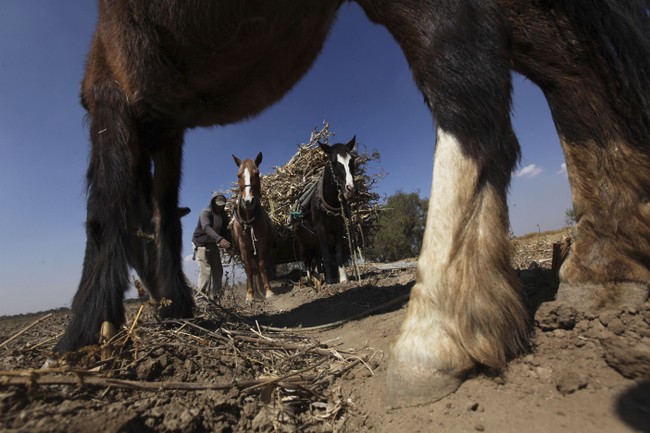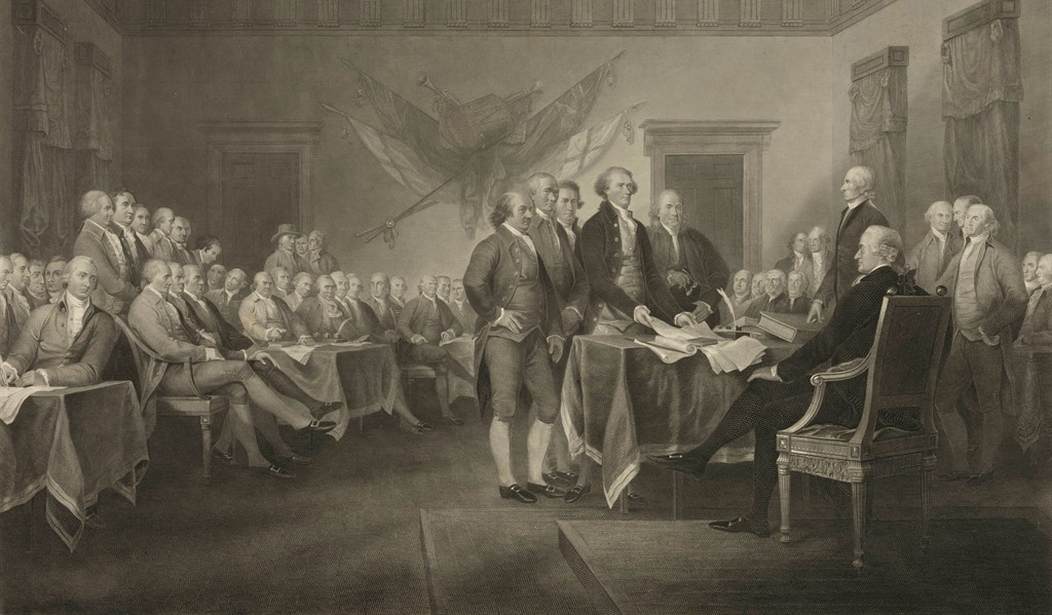When the Poop Hits the Fan III – Starting to Rebuild
The current political situation notwithstanding, I reckon the odds of a major societal collapse to be pretty low. Things aren’t so hot right now, but the power is still on, and the gas stations still have fuel. But still – there are and will be rolling blackouts in California. There have been riots in the streets, most notably in 2020's "Summer of Love." So, in the event the malodorous assimilated residue of the digestive process meets the oscillating air-movement device, it’s probably good to have some idea of what to do next. It’s probably good to have some idea what to do well ahead of time.
Previously on RedState: When Things Go Really South, Part I - How to Survive the Event
When Things Go Really South, Part II - How to Keep Your Stuff
Even if it doesn’t actually happen, well, times are interesting, and in times like these, it’s sometimes entertaining to examine what life could be like after a major societal collapse. So, this series will give the thoughts of a simple old country boy from Allamakee County on how to get through any such really, really bad times.
Local Alliances
As with many things, any rebuilding is likely to begin with one’s neighbors. The rebuilding process would likely begin with something as routine as trading your neighbor a couple of bars of homemade soap for a couple of cups of salt.
At this level, barter can work quite well. And, at this level, having some skill at something that can be done under trying circumstances can give you items to barter. Making soap is a great example. Soap is a great commodity, as cleanliness is next to healthiness, and maintaining hygiene of self and surroundings is important – and soap can make that possible.
A young, healthy guy who is a good shot might choose to scour surrounding woods and fields for edible game or furbearers, to be bartered perhaps for more ammo with which to bring in more game. Or he may just trade his strong arms and back to help cut and split firewood in exchange for a hot meal.
Someone who knows how to weld, or how to machine metal would have no problem finding someone willing to trade for his skill. Ditto for a good carpenter or mechanic. Both sets of my grandparents raised families through the Depression, and both of my grandfathers always said that “a man who’s good with his hands will never go hungry.”
Acquiring some such skill in advance, assuming one hasn’t already done so, would seem a prudent move. Speaking for us here in our Susitna Valley homestead, my wife knows the finer points of making soap with a variety of ingredients (she once made a batch of soap from clarified bacon grease, just to see if it would work) and can make a sewing machine sit up and beg. I’m pretty handy with guns – I can clean them, zero them, load for them, and am a pretty fair jackleg gunsmith. And, since our house is heated largely with wood, it’s good that I can run a chainsaw and know one end of an axe from the other.
Basic skills for a back-to-basics lifestyle; that’s the ticket. Skills have value, too, which brings us to…
Building Trust
The key to building trust is in maintaining mutually advantageous relationships. Specifically: trade. And the neat thing (one of the few neat things, in fact) about a world recovering from a SHTF situation is the freedom that folks would have in re-establishing trade.
I’ve always disliked the term “capitalism.” In its proper form, there’s no “-ism” to capitalism, no underlying ideology; just free people, freely trading their own skills, assets, knowledge, and resources with each other – a free and voluntary exchange of value for value, in which all parties realize a gain. Everybody wins. Aside from this free exchange, there are only two other ways in which assets can change hands: By force, which is theft, or by deceit, which is fraud. Free exchange and free trade, generally known as capitalism, are the only acceptable means.
People doing business together is the best way. And it’s the best way to build trust.
Sure, there will always be some fraudsters and crooks among us. But the best way to deal with them in such a situation is to ostracize the fraudsters and eliminate the thieves; the fraudsters would soon find being able to rely only on themselves uncomfortable, and the thieves would either depart for greener pastures or be… dealt with, by some other means.
See Related: Tennessee Sheriff's Office Faces Scrutiny for Stealing Livestock Without a Warrant
Rebuilding a society doesn’t mean that there won’t be some harsh measures required.
Why is this important? Because you can’t have any kind of reliable alliances, local or otherwise, without a certain level of trust. Being trustworthy means being reliable – it means being honest – it means doing what you said you’d do. It means if you screw something up, you make it good. Mutual advantage will go a long way towards keeping trade on the up and up, but for broader issues on a larger scale, a level of trust between people and communities will be required. Speaking of which…
Broader Alliances
Local alliances will eventually, if all goes well, reach the size of what one might call a village, or maybe a small town. But as rebuilding continues, some sort of larger alliance may form, one that would require some sort of (I know, I know) government.
But it wouldn’t have to be government as we know it today. At least, we can hope not. One would hope that, in a scenario like this, people would realize that where the government is concerned, we drove the old model until the wheels came off, and maybe it's time to try something else.
Picture three villages separated by perhaps thirty or forty miles. One village is along the coast and has several members dedicated to making salt by drying seawater in flat basins. A second is found on the high plains some way to the east, and several members have banded together to raise a herd based on the few beef cattle that have made it through earlier stages of the collapse. The third lies in the wooded hills to the north and has formed a local specialty of producing building timber and charcoal.
Salt, timber, charcoal, and beef all have their uses, and all are produced locally. The village producing salt may have no timber nearby, while the village with the herders lacks a source of salt for preserving meat and hides. So, how to organize trade? Well, with delegates – a trade commission, chosen from among the people of the various villages. Sometimes, a notable figure will step up and lead, but more often, it's going to be a group of people with distributed interests. They could be volunteers, but if there is a surplus of volunteers, it may be necessary to choose from among them. By, well, you know, some sort of election.
See Related: George Washington: Original American Badass
The delegates wouldn’t have to have any authority; at least, not in the sense that they can tell anyone what to do. They would, ideally, have the authority to negotiate a trade deal with another village.
That could be the beginning. From a loose alliance of villages to something more like a county – or a state. One could hope that the level of government would remain no higher than trade negotiating authority, but as a society grows, there are a few larger issues that might negate that hope. Which leads to… 
Distributed Interests
As a society begins to produce on a larger scale, as the overall wealth of a community grows, there are always those who would seek to take that wealth by force. To that end, some sort of common defense — a militia — would likely be necessary. That could be done by forming some kind of government. But is that really necessary?
Government, of course, has only two legitimate functions: to protect the freedom and property of the citizenry. In short: to keep others from hurting you or taking your stuff. How else to accomplish those two things?
As the kind of trade alliances we described above come into being, there would be reason to think about protecting trade routes and whatever kind of trade caravans would be necessary. There would also be a need to set up regular routes and maintain those routes (roads), which would facilitate such protection.
Still, this could, of course, be done outside of any government. A volunteer militia could serve as local defense, and the traders could hire guards and workers to maintain the roads, as they would be the ones with an interest in so doing. Whether this would scale up to a level larger than a regional alliance of a few small communities remains to be seen. This would require that the community factor the costs of these activities into their production. And pricing can easily be facilitated by one thing: Money.
Mediums of Trade
Think for a moment about currency.
In any growing society that is proceeding with the development of a division of labor, some form of currency becomes necessary. Why? Currency is, at its heart, a tool we use to trade with one another. It’s a medium of exchange, and in a developed, modern economy doesn’t always carry an inherent value in and of itself; a fiat currency could be paper, electrons, or cowry shells, as long as all parties agree to a certain value per unit.
But in a growing, rebuilding society one would think that a currency with some intrinsic value would be easier for everyone to agree on, as the currency itself would be subject to market forces.
The Old Man used to say, “Something is worth whatever you can get someone to pay you for it.”
I’ve long suspected that in an immediate post-crisis world, one of the primary replacements for a traditional currency would be obvious: Ammo. Modern ammo requires an industrial base to produce, and if things are really bad, there wouldn’t be any new supply. The problem is that ammo, once expended, is gone, which would rapidly drive up the value. A freshly dead rabbit may be worth five .22 shells today, ten next week, fifty next month.
So, what has intrinsic value and isn’t expendable? Metals, of course.
In the early stages of a SHTF scenario, of course, gold and silver may be worth no more than lead among people concerned with feeding themselves. But as some level of production, trade, and prosperity return, it’s not unreasonable to think that precious metals would regain some of their former luster.
In the past, of course, other commodities have also served as currency of sorts: Salt, for example, or spices, or useful metals like lead or aluminum.
Either way, it’s a currency – money. And money, that tool we use to trade with one another, value for value, is the wellspring of trade. Indeed, it’s the wellspring of civilization. The establishment of some standard currency would be a major hurdle on the way back.
It may be the major hurdle.
A New World?
Maybe. Maybe not. In the event of such a world-shaking event, I think it is far more likely that local warlords (see the Capitol Hill Autonomous Zone) would seize control in too many areas for any kind of widespread alliance and, eventually, a new society to form. Such is, after all, the norm for the vast majority of human history.
But that just may be my misanthropic streak speaking.
All of this is, of course, conjecture. It may never happen, and I sure hope it doesn’t. But if it does… Well, remember that Boy Scout motto.















